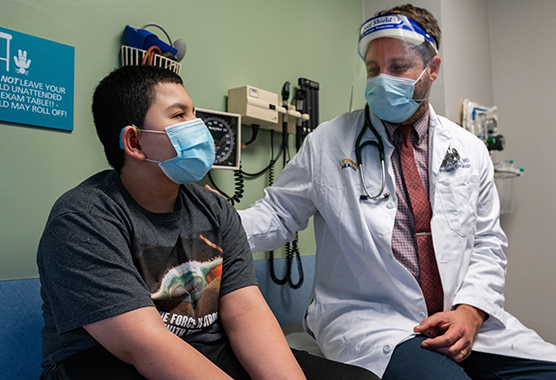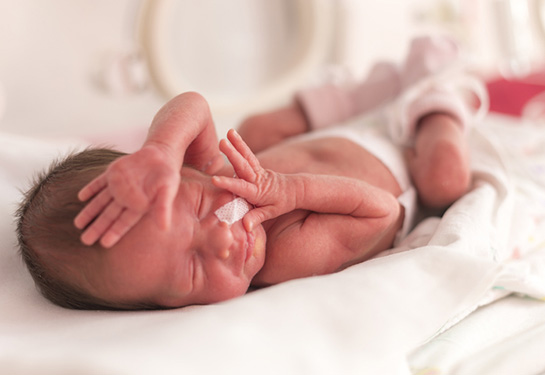Kawasaki Disease
Our cardiologists provide the highest level of care for newly diagnosed Kawasaki disease and its lasting effects.
Medically reviewed by Daniel Cortez, M.D. on June 21, 2023.

Expert Care for Kawasaki Disease
UC Davis Health’s Pediatric Heart Center provides comprehensive, expert care for children with Kawasaki disease. Whenever possible, our pediatric cardiologists treat children during the early stages of illness to prevent complications. We also provide advanced, compassionate care for the lasting effects of Kawasaki disease.
Adults who had Kawasaki disease as children also receive coordinated care from UC Davis Health’s leading-edge heart and vascular services.
What Is Kawasaki Disease?
Kawasaki disease is a childhood illness that causes sudden, severe swelling (inflammation) of the blood vessels. It usually affects children under age 5, but older children and teens can also get Kawasaki disease.
A Japanese pediatrician named Tomisaku Kawasaki described Kawasaki disease in 1967 in Japan, where it is more common. Other names for Kawasaki disease include mucocutaneous lymph node syndrome and Kawasaki syndrome.
Kawasaki disease is rare and highly treatable. Most children who receive prompt treatment recover fully.
Without treatment, Kawasaki disease can damage the arteries that carry blood to the child’s heart (coronary arteries). This damage can lead to an aneurysm — a bulge that forms in a weakened area of the artery wall.
Other heart problems can also occur, such as blood clots, heart valve disease and arrhythmia. Children who develop heart conditions from Kawasaki disease require long-term monitoring and follow-up care.
Symptoms of Kawasaki Disease
Kawasaki disease symptoms usually start quickly and may progress in phases. Early symptoms include a fever and inflamed tissues. Abdominal pain and joint pain can develop after the initial illness. If not treated, a range of heart conditions and related symptoms can occur.
Common Symptoms
The main symptom of early Kawasaki disease is a fever (100.4 degrees F or higher) lasting at least 5 days. Children also typically have 4 of the 5 following symptoms:
- Bloodshot eyes
- Large, swollen lymph glands in the neck, usually on one side
- Red, cracked lips and a red, swollen, strawberry-like tongue
- Skin rash over the trunk of the body
- Swollen, red skin on the hands and feet, followed by peeling skin on the fingers and toes
Emergency Symptoms
If left untreated, Kawasaki disease can lead to serious heart problems. Call 911 if you or your child experience symptoms including:
- Pain in the chest, arms, shoulder, jaw or back
- Dizziness or fainting
- Nausea or vomiting
- Heart palpitations (rapid, pounding or irregular heartbeat)
- Shortness of breath
- Weakness or fatigue
Causes and Risk Factors of Kawasaki Disease
Physicians aren’t sure what causes Kawasaki disease. It may be related to viral infections or genetic changes (mutations). Kawasaki disease is not contagious and does not seem to run in families.
The following factors make certain people more at risk for Kawasaki disease:
Age
About 80% of children develop Kawasaki disease before age 5.
Biological Sex
Kawasaki disease more commonly affects boys than girls.
Race
Kawasaki disease is more common in children of Asian descent.
Diagnosing Kawasaki Disease
There is no specific test for Kawasaki disease. Our experienced physicians look for specific signs and symptoms. They also ask about earlier symptoms in your child’s illness.
Your physician may order laboratory and imaging tests to help make a diagnosis or rule out other illnesses. For example, blood and urine tests can detect general inflammation. An echocardiogram, which makes detailed ultrasound images of your child’s heart, may show coronary artery damage.
Some children do not have a typical pattern of symptoms. If your child has atypical symptoms and your physician suspects Kawasaki disease, they may call it “incomplete Kawasaki disease.”
Kawasaki Disease Treatments at UC Davis Health
Your child will receive treatment in the hospital over a few days or weeks. We understand a hospital stay can be stressful for children and families. At UC Davis Health, our multidisciplinary team provides complete care for your child and family.
The most common medications physicians use to treat Kawasaki disease include:
Intravenous Immunoglobulin (IVIG)
IVIG contains antibodies — proteins in the blood that fight infections and decrease inflammation. IVIG manufacturers take antibodies from healthy donors and put them into a medication physicians use to treat many diseases.
Your child will receive IVIG through a line inserted into a vein. IVIG treatment early in illness can prevent damage to your child’s coronary arteries and allow for a full recovery.
Aspirin
Aspirin helps reduce symptoms, such as fever, pain and swelling. It can also help prevent the formation of blood clots.
"What is Kawasaki Disease," Kawasaki Disease Foundation, https://kdfoundation.org/what-is-kawasaki-disease/
Who does it affect?
4,200+Children affected in the U.S. each year
A top cause of child heart disease
#1Cause of acquired heart disease (heart disease not present at birth) in children
Outcomes without treatment
25%Of children who don’t receive treatment will have lasting heart damage
Source: Kawasaki Disease Foundation: What is Kawasaki Disease?
Request an Appointment
As Sacramento's No. 1 hospital, you'll benefit from unique advantages in primary care and specialty care. This includes prevention, diagnosis and treatment options from experts in 150 specialties.
Referring Physicians
To refer a patient, submit an electronic referral form or call.
800-4-UCDAVIS
Patients
Call to make an appointment.
Consumer Resource Center
800-2-UCDAVIS

Ranked among the nation’s best hospitals
A U.S. News & World Report best hospital in cardiology, heart & vascular surgery, diabetes & endocrinology, ENT, geriatrics, neurology & neurosurgery, and pulmonology & lung surgery.

Ranked among the nation’s best children’s hospitals
U.S. News & World Report ranked UC Davis Children’s Hospital among the best in pediatric nephrology, orthopedics*, and pulmonology & lung surgery. (*Together with Shriners Children’s Northern California)

Ranked Sacramento’s #1 hospital
Ranked Sacramento’s #1 hospital by U.S. News, and high-performing in aortic valve surgery, back surgery (spinal fusion), COPD, colon cancer surgery, diabetes, gynecological cancer surgery, heart arrhythmia, heart failure, kidney failure, leukemia, lymphoma & myeloma, lung cancer surgery, pacemaker implantation, pneumonia, prostate cancer surgery, stroke, TAVR, cancer, orthopedics, gastroenterology & GI surgery, and urology.

The nation’s highest nursing honor
UC Davis Medical Center has received Magnet® recognition, the nation’s highest honor for nursing excellence.

World-class cancer care
One of ~59 U.S. cancer centers designated “comprehensive” by the National Cancer Institute.

A leader in health care equality
For the 13th consecutive year, UC Davis Medical Center has been recognized as an LGBTQ+ Healthcare Equality Leader by the educational arm of America’s largest civil rights organization.

